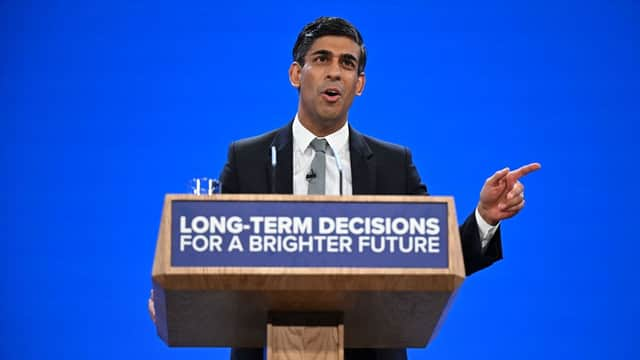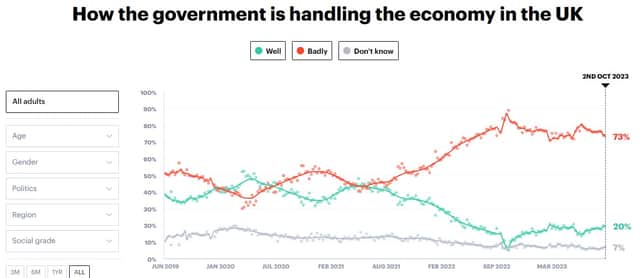Rishi Sunak’s focus on ‘long-term decisions’ misses voters' biggest issue - the cost of living crisis
and live on Freeview channel 276
Rishi Sunak was very clear - he wants to be a politician whose focus is firmly on the future. You can’t miss it, with posters and signs all across the Conservative Party Conference stating “long-term decisions for a brighter future”. Activists even blocked my view of his speech at one point, with a wall of placards.
Leaving aside, for the moment, the irony around watering down net zero targets and cancelling half of the country’s biggest infrastructure project for a generation in the name of long-term thinking, no one can argue that banning cigarettes and reforming A-levels aren’t policies that could have huge benefits down the line.
Advertisement
Hide AdAdvertisement
Hide AdBut focusing so much on “long-term decisions for a brighter future”, the Prime Minister has taken his eye off the most pressing issue facing the public at the moment, the cost of living crisis.
Sunak’s speech was a clunky mishmash of disconnected policy ideas underpinned by a weak argument that he represents change at the next election, while Sir Keir Starmer is “more of the same”. Pull the other one Rishi. While his own personal history is inspiring, it was not clear what story he was trying to sell to the voters - and the overall plan of how to insert long-term thinking into the government was left unclear.


One thing his speech was noticeable for, was almost no mention of the cost of living crisis. The only real reference was when Sunak said “we will deliver tax cuts, but the best tax cut I can give to people is to halt inflation and ease the cost of living crisis”.
There was no reference of the mortgage crisis, which is only going to affect more and more homeowners ahead of the election, other than to use it as an attack on Liz Truss. Sunak said: “You cannot borrow your way out of inflation. Halving inflation was the first and most important one of my five priorities.”
Advertisement
Hide AdAdvertisement
Hide AdHowever the way the Prime Minister was talking was as if the cost of living crisis was over. He has previously sounded wooden and out of touch when responding to a caller on LBC, whose monthly payments increased by £1,500 a month to £2,800. All the Prime Minister could say was that it was important to note that the average payment was going up by £200.
And while education reform and smoking bans are arguably good policies, they’re nowhere near the top of voters’ priorities. According to YouGov, 54% of people think the economy is one of the three biggest issues facing the country. That was the issue with the most responses, while only 13% of people think education is one of our nation’s biggest problems.


The pollster also found that 72% of people think the government is handling the economy badly, and only 20% think it's being handled well. And Sunak barely touched on this, other than to mention that inflation is coming down. It is, but families across the country are still feeling the pinch, and energy bills are likely to go up again this winter.
According to YouGov, the second most important issue for voters is health - and while banning smoking is an admirable public health policy - most people I speak to are concerned about NHS waiting lists and getting access to a dentist.
Advertisement
Hide AdAdvertisement
Hide AdHowever, Sunak used the health section of his speech to hit out at striking doctors and big up his previously announced NHS workforce plan. There was nothing on social care, which is in urgent need of reform and causes huge capacity issues at hospitals, or dental treatment, which is a problem all over the country.
The Prime Minister did at least attempt to tackle some of the productivity issues the UK is facing, by reiterating Jeremy Hunt’s announcement on their plans to get Britons, who are classed as long-term sick, back into work. Laura Farris, the Tory MP for Newbury, was particularly excited about this, saying: “If you’re not in work, it’s like your whole life is on the scrapheap, it’s not good for the individual, so I do really support that.”
However when that comes after the cancellation of HS2 to Manchester, with a lot of piece-meal projects touted as replacements, it’s hard to see where the coherent strategy is for improving growth and productivity. Rail experts say HS2 was essential for increasing capacity on our network, while Sunak’s new announcement doesn’t solve this core problem.
And by focusing on transport in the north of England, health and education, he’s effectively ignoring people in the devolved nations. It’s hard to see how banning vapes and cigarettes from youngsters, bringing in a British baccalaureate and axing HS2 links together in a coherent package for voters.
Advertisement
Hide AdAdvertisement
Hide AdThe Tory faithful enjoyed his speech. Councillor Abbas Merali said it was “absolutely brilliant”. He said: “The vision and the leadership are a breath of fresh air in politics.” While Farris told me: “I thought it was a very direct statement, not just his ambition for the country, but some things he wanted to say that he thinks the country needs to hear.”
However I think Sunak and the Conservatives will have to come up with a better pitch around the cost of living crisis and the economy if they want voters to take a long-term decision and elect them for a fifth term.
Comment Guidelines
National World encourages reader discussion on our stories. User feedback, insights and back-and-forth exchanges add a rich layer of context to reporting. Please review our Community Guidelines before commenting.
